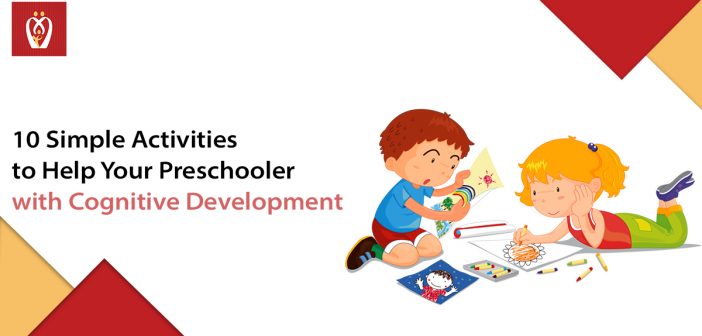Introduction
Nurturing your child’s cognitive development from the moment they are born lays the groundwork for future academic and life success. The way preschoolers think, investigate, and figure things out is referred to as cognitive development. It is the growth of information, abilities, and attitudes that assist children in thinking about and comprehending the world around them.
It is said that most of the cognitive development of the child happens during the first year, and by the time they are six, they have grown up to 99% of their cognitive potential. In such a situation, it makes absolute sense to engage the kids in activities that would sharpen their cognitive abilities further. In this blog, we talk about ten such!

cognitive development
Ten simple activities to help your preschooler with cognitive development
It’s incredible how play may boost a child’s cognitive development — their capacity to comprehend, analyse, envision, reason, solve issues and see beyond the apparent. These simple yet effective activities can help promote cognitive development in preschoolers. In addition, simple exercises that you can incorporate into your daily routine as a parent can help your child’s cognitive development in the areas of memory, focus, concentration, and sight. Here are some simple things you can do to support your child’s cognitive development:
- Sing songs with your kid and encourage them to participate. Play their favourite songs and music in the house and the car regularly, and they could start singing along on their own. This practice aids in the development of memory and word recognition.
- Ask your child to list the sounds that they hear throughout the day. Then, they’ll start to realise how noises are connected to things they encounter regularly.
- Look for opportunities to practise counting throughout the day. For example, when you go to the park, count the number of shoes in your child’s wardrobe or the number of slides on the playground. You could find yourself counting everything shortly!
- Singing along to the “Alphabet Song,” reading alphabet books, and playing with alphabet puzzles may all help your kid recognise letters. Here’s an example of a simple game you may play with your preschooler to help them learn letters.
- Cut out separate pieces with each letter of the alphabet printed in vibrant colours.
- Mix them up and tape them to different surfaces in the home.
- Walk your youngster through the alphabet, encouraging them to look around the house for the next letter and tape it on the wall in the correct order.
- When you’re done, hang the letters on the wall in sequence until you’re ready to play the game again.
- When communicating with your kid, identify shapes and colours. For example, when playing in the yard, you can remark, “That is around, blue ball,” or “That sign is a red octagon,” when approaching a stop sign. You might ask them to explain items to you when they get older.
- Asking your child questions like, “Which toy should we pick up first when we clean up the living room?” is another method to help him learn to think for himself. Alternatively, “Why is it necessary to take it to slow down the stairs?” You may help them learn how to solve problems and better understand their surroundings by asking them questions.
- “Would you prefer to wear brown shorts or blue shorts?” ask your preschooler when you get the opportunity. “Would you want string cheese or yoghurt with your lunch?” or “Would you like string cheese or yoghurt with your lunch?” This will assist them in becoming more self-sufficient and learning to make confident decisions that influence their day.
- Playing with common household things is instructive, entertaining, and inexpensive. For example, encourage your kid to match different-sized lids to the pots they go with or have them look in the mirror and point to their nose, mouth, eyes, and other facial features.
- To encourage their interest and offer them “hands-on” experiences, take them to your local children’s museum, library, or farmer’s market. While you’re exploring, ask them questions and listen to his replies. These excursions may give both of you valuable learning opportunities.
- To foster problem solving and creativity, play a range of games with your youngster. If your child is younger, you and your child can play “Peek-a-Boo” using bricks. You may play board games, riddles, and “Hide and Seek” with them as they get older.
10-month-old baby development milestones
You’ve probably noticed your baby’s astonishing changes now that he’s ten months old. It will be incredible to witness your baby’s rapid development into an individual who is now playing, moving around, and attempting to speak like a seasoned expert! Your ten-month-old is taking advantage of their newfound independence by going on an exploratory drive. So, let us list out some major developmental milestones for your ten-month-old for you to observe and appreciate.
| Achieved developmental milestones | Milestones to be achieved |
| They Crawl and lift themselves to a standing position.
Have a basic understanding of the meaning of a few words. From the tummy to the sitting position Comprehends demands Basic movements are imitated Look for hidden items. Reacts to situations that are frightening or distressing. possesses a pincer grip Depth perception has improved. Has some incisors |
Supportive walking
Understands and communicates in basic language. Possess the ability to stand up from a seated posture. Basic instructions are comprehended. After observation, the activity is repeated. By memory, recall the position of items. Responds to a greater variety of situations Can grip items with both hands Improved depth perception and coordination By the first birthday, a child may have eight teeth. |
Promoting cognitive development with Nurturey
Nurturey’s PinkBook is the smartest digital upgrade for the NHS paper red book. Nurturey’s PinkBook intuitive tools assist pregnant women and parents with young children manage their child’s health and pregnancy journey while feeling supported, informed, and empowered. PinkBook’s child health tools were created in accordance with the NHS paper red book.
For example, with our child tools like Milestones, you can be assured that your child is achieving growth at a normal pace. In addition, you can keep track of your child’s overdue milestones that need immediate attention as well as get trusted information at each stage of your child’s milestone achievement. And this is not all, there is a lot more that you can explore and utilise as you enter this beautiful journey of being a parent.







